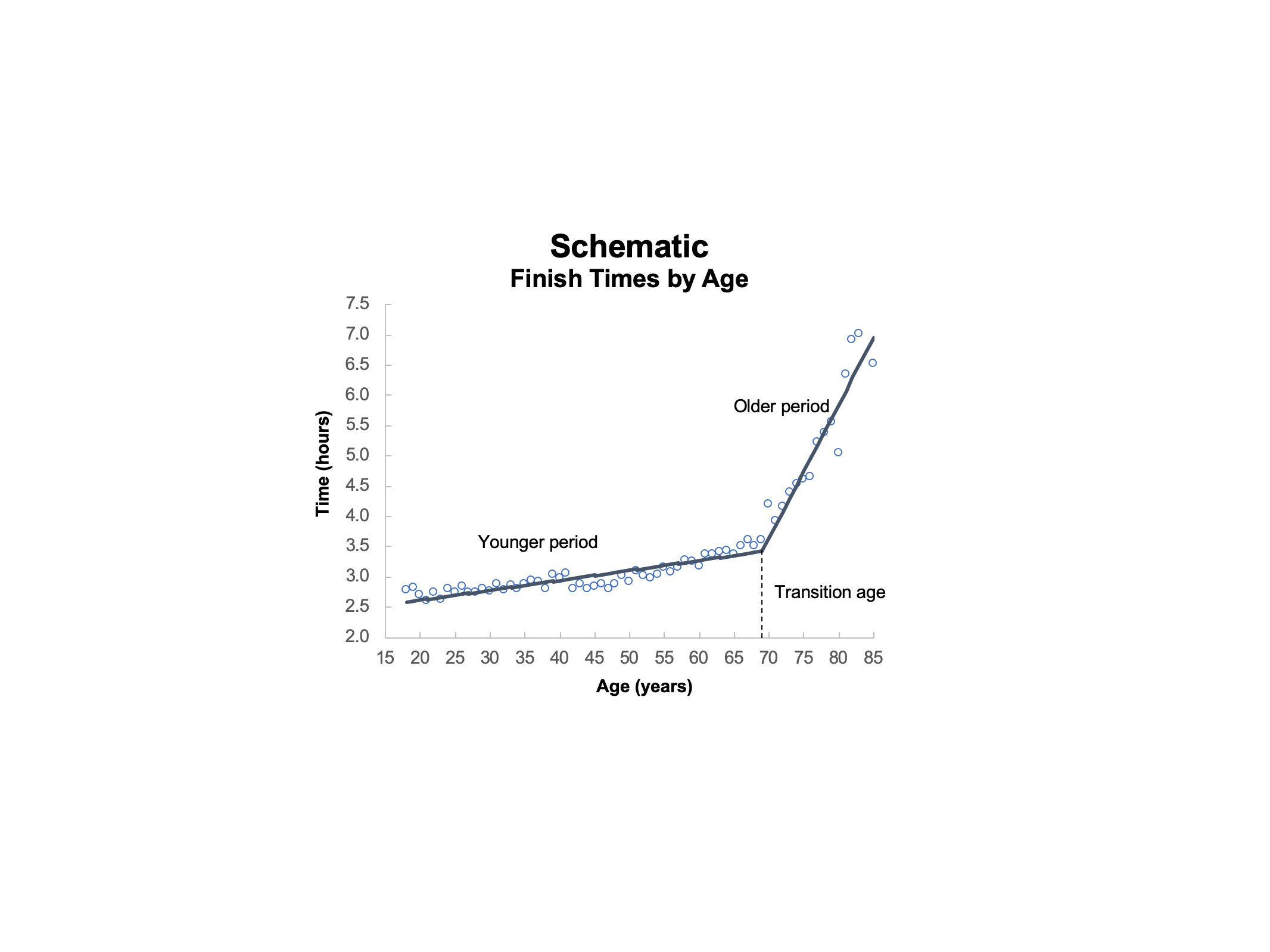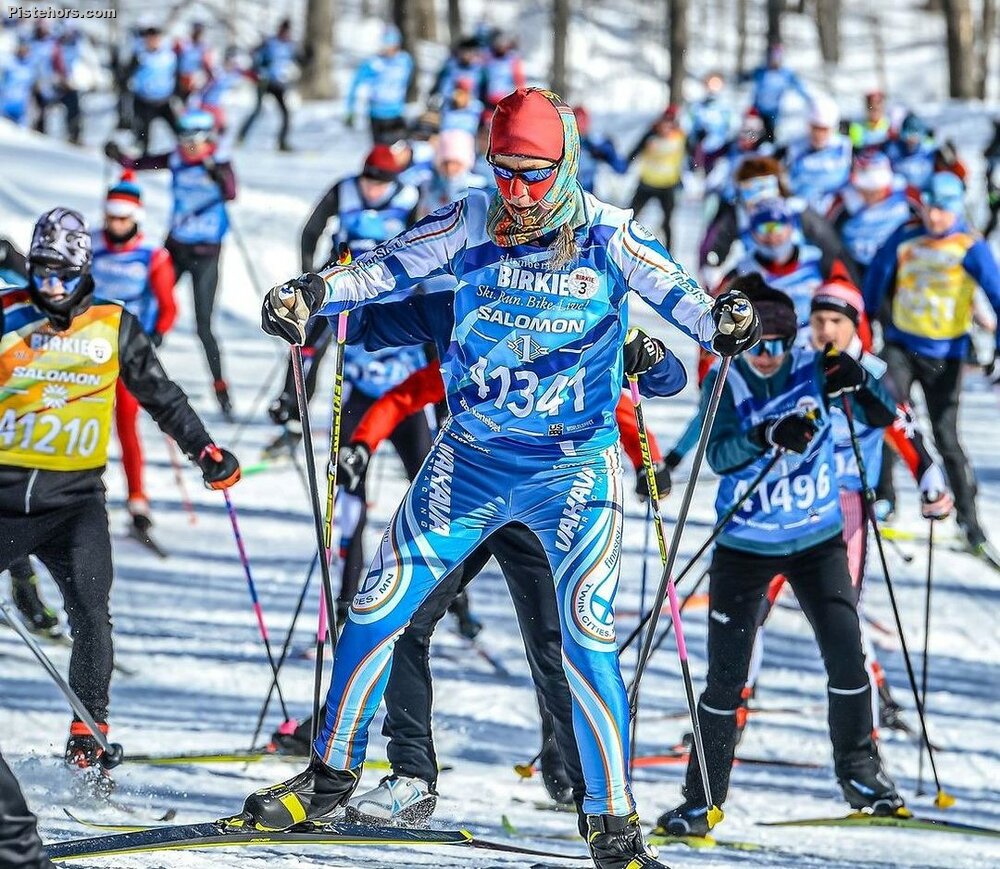Do endurance athletes age like fine wine, or vinegar? Data mining of the American Birkie results by Jim Coors on the website xcskistats.info has thrown up some interesting results. The Birkie is a cross country ski marathon of around 55 km depending on the route taking on a particular year. The database was built by scanning pdf results from 1999 onwards. A rather tedious process. There are over 85,000 entries covering both skating and classic skiing.
Regarding the aging question it seems there is a gradual decrease in performance from around the early 20s to 68 years old then a very sharp transition at that point. The surprising thing is that by your early 20s you already seem to be over the hill. From 22 to 60 you can expect to be 45 minutes slower, that equates to about a minute per year lost but there is a transition point in the late 60s where, you lose a whopping 5 minutes per year!
That’s an average. Elite athletes continue improving through their 20s. What the data appears to show is that for recreational skiers, families, careers, life take over until their early 40s when, with the kids at college, they can get back to focusing on their passions. If you are a cup half full person the takeout is you can remain pretty fit, fast and active right up to the end of your allotted three score years and ten; like a fine red wine but no optimally trained athletes improve after their mid 40s.

Talking of the transition points this occurs about ten years later for classic skiers at 69 for men and 61 for women but a full decade earlier for skate skiers. It appears that skate skiers, finding the movements hard on the joints, take up classic style. This may be an issue with poor skate technique and skaters able to “beast it” around a course, until they can’t. Another positive is that men were still competing well into their 80s over the 50k+ distance. Why the transition? This could be down to being able to train less and less hard as the body ages which creates a feedback loop meaning that fitness declines more steeply at some point. Older skiers may also simply not be interested in hard training and do the events for a fun or social aspect although the steep decline is also seen at the podium level, indeed it is much steeper! albeit from a much higher base (3 hours compared to 5 hours finish time at 69 for men).
Over the years, the biggest improvement in performance has been with classic style. Average pace has improved from around 6m20/km in 1999 to 5m/km in 2009 although performances have yoyo-ed a bit in the last ten years. Skate ski performances have actually declined, from around 3m55/km to 4m05/km. This is probably due to the slight aging of the male skate community which dominates these results. The improvement in the classic times came in the mid 2000s due to track improvements in the Birkie which also had the effect of attracting higher level and younger competitors. There has also been a shift in classic racing to double polling at the top level whereas skating has shown less advance in technique although top level competitors will now V2 (skate 2) on the flats and up moderate hills.

Interest in the Birkie has been growing, especially among women. There were almost no classic female skiers in 1999, there are nearly 500 starting today and they are joined by 600 men, a figure that is relatively steady. Again skate women have grown from around 100 to 1500 today whereas skate men have dropped from 3700 to 3000 today although participation has been growing since the early 2000s.
Remember this is an American race with different cultural norms from Europe. Jim Coors, suggests that the lack of older female competitors goes back to the fact that it was unusual for women to do competitive sport in the USA in the 1970s.
Fortunately a team from Zurich university has studied the Swiss Engadin Ski Marathon. They have an even larger database, 197,825 result over a similar period to Coors’ data. 5 times more men finish this 42km race than women. The ratio is just 2.4 in the 20-24 age group but as with the Birkie women drop out of the sport earlier than men, probably due to both child rearing and hormonal and physical changes associated with the menopause.
They note that age-related decline is less pronounced for endurance events and that whereas the performance of younger athletes has remained similar, masters level competitors have significantly improved their performances over the years; probably due to better training regimens.
Around 11,000 competitors take part in the Engadin Ski Marathon annually and the race is held at 1,800 meters altitude. Significantly higher than the Scandinavian long distance races like Birkebeinerrennet from which the American Birkie takes its name. Overall average race times were the same between men and women. It is possible that the smaller cohort of women consists of more committed recreational skiers because when elite (top ten) finishers were considered women were about 9% slower than men. Peak age performance for all women and men was around 40 years old, for elite athletes 38.4 and 42.2 years. Again this probably reflects the training required at this level and family commitments of female athletes.The study compared long distance cross country skiing to marathon running. It noted more male ski competitors but that ski racers maintained high performance levels up to ten years longer than runners. The difference may be down to the level of technique required in cross country skiing plus the fact that it recruits both upper and lower body. It is also lower impact compared to running. Most marathon events are also in cities closer to sea level and this is thought to play a role. Altitude possibly negating the effects of declining VO2max and muscle power with age. An interesting area of further study is the earlier and more pronounced decline in the performance of female competitors and whether different training approaches could address this.
If you are of a geeky nature you can explore the data in more detail: https://xcskistats.info/ and the Swiss study can be read here: The age-related performance decline in marathon cross-country skiing - theEngadin Ski Marathon